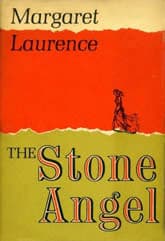The Stone Angel
Critique • Quotes • At the movies
 First edition
First editionFirst publication
1964
Literature form
Novel
Genres
Literary
Writing language
English
Author's country
Canada
Length
Approx. 106,000 words
Raging against the light
Several times during readings of The Stone Angel I have been so impressed by Margaret Laurence's complete commitment to the character, the elderly Hagar Shipley who relives her entire life in memory while on the lam from a nursing home. A great sustained acting job, never stepping out of character.
Then occasionally I've found something forced and obvious about the narration, written by Laurence when she was still in her thirties, as though the author was trying too hard to come across as a crusty, old gal with a life of secrets unknown to the younger folks.
But mostly I'm just completely taken.
I've seen several reviews about what an heroic and inspiring character Hagar is. True, she is strong, proud and bold. But she's also a mean, petty, headstrong woman who ruined one son and is making life a misery for her other one. She has regrets for things she's done but it's unlikely she'd change much if she had the chance to live it all over again. Yes, she has suffered many hardships which she has had to overcome in her life, but, more often, she has been a victim of her own pigheadedness and narrow-mindedness which she will never overcome.
In short, Hagar is a real person, not an inspiring example for a Reader's Digest article. Somehow you come to love her without ever liking her.
Seeing beyond her words
Most impressive is that we the readers see the various ambiguities that Hagar has refused to face during her life, despite the story being told entirely by Hagar. Laurence's sentences are short and declarative, but get across greater meanings than conveyed directly by the words.
We see through Hagar's eyes what she sees—and much more. We even see things that Hagar does not want us to see. Sometimes we doubt what she tells us she sees. We come to recognize how this variation on the unreliable narrator shades and colours what she reports. We make allowances to discover our own truths.
The economy of expression rises to the level of mastery. For example, rather than go on about the weather as some authors do, Laurence, in Hagar's voice, will simply note, "Rain."
What more do we need for the sake of the story? That's my kind of writing.
The Stone Angel is one of those novels that made many of us become readers in the first place. It takes us inside someone else's mind, not to escape our own lives but to challenge them.
— Eric
Critique • Quotes • At the movies

